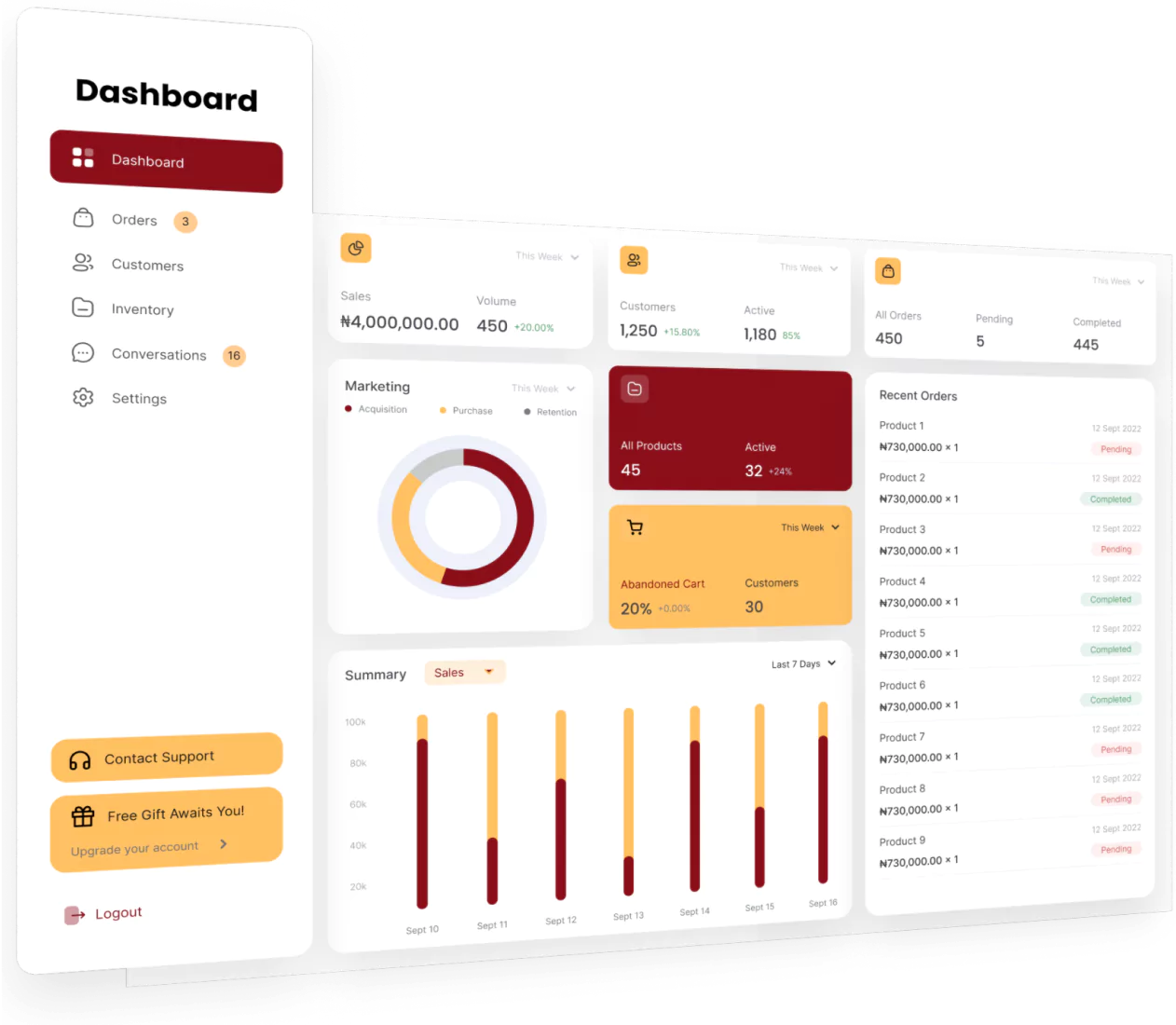Managing a business has taught me one thing: speed and precision matter more than ever. Traditional ERP systems often fall short as they’re too rigid and don’t adapt fast enough. That’s where AI ERP comes in, making operations smarter, more agile, and data-driven.
Gartner found that 80 to 90 percent of enterprise data is unstructured, yet most companies still don’t use AI-powered ERP to make sense of it. On top of that, employees are spending up to 40 percent of their time on repetitive work that could easily be automated.
That’s why AI ERP is no longer optional. It helps us reduce wasted time, unlock insights, and improve efficiency across the board. If you’re curious how this works in practice, try our free demo and explore what’s possible.
Key Takeaways
|
What Is AI ERP and Why It’s Changing the Game
Enterprise Resource Planning (ERP) technologies have been essential in business management since the 1990s, originally designed to streamline financial transactions and inventory tracking. As businesses became more complex, ERP systems evolved to incorporate automation and analytics, minimizing manual effort and improving efficiency.
By the early 2000s, AI-based automation began reshaping ERP implementation, enabling businesses to automate data entry, financial reporting, and supply chain processes. While early versions focused on rule-based automation, today’s AI-powered ERP solutions use machine learning (ML) and predictive analytics to support real-time decision-making and increase operational accuracy.
How AI ERP Automation Solves Your Everyday Bottlenecks

Modern ERP software with AI capabilities uses natural language processing (NLP), machine learning, and predictive insights to optimize business operations. These solutions analyze data, adapt to market trends, and automate decisions, helping businesses increase efficiency and reduce costs.
AI-enhanced ERP adoption is skyrocketing, fueled by the demand for real-time data processing and workflow automation. Industry leaders are investing billions in these platforms, which allow businesses to make faster, data-driven decisions and improve overall workflow efficiency.
As AI for business technology advances, ERP software will become more scalable, intuitive, and adaptable. Integrating cloud computing, generative Artificial Intelligence, and predictive analytics is shaping the future of enterprise management.
To fully understand the impact, let’s explore key AI-powered features in ERP systems and how they transform business processes.
Types of AI You Can Use in an ERP System
Integrating AI in all the best ERP software brings a range of technologies that enhance automation, analytics, and decision-making. These intelligent features enable businesses to optimize efficiency, improve accuracy, and unlock new strategic opportunities. The following are the primary AI-driven capabilities in modern ERP systems:
1. Predictive analytics for proactive decision-making
Traditional ERP solutions rely on past data, but AI-enhanced ERP systems analyze trends, forecast outcomes, and provide actionable insights. Businesses use predictive analytics to anticipate demand, detect financial risks, and improve resource planning.
2. Natural language processing (NLP) for smarter user interactions
NLP enables AI-driven ERP platforms to understand and respond to human language, making software more intuitive. Artificial Intelligence chatbots and virtual assistants help employees navigate ERP systems, retrieve information, and handle customer inquiries efficiently.
3. Robotic process automation (RPA) for task automation
RPA automates invoice processing, order tracking, HR approvals, and data entry, minimizing human error. AI-powered ERP bots further streamline workflows, ensuring faster and more accurate processing.
4. Machine learning (ML) for continuous improvement
ML algorithms allow ERP systems to learn from data as they evolve, recognizing patterns and spotting anomalies. AI-driven ERP solutions continuously optimize performance by making data-informed improvements independently of human intervention.
5. AI chatbots and virtual assistants for real-time assistance
ERP AI chatbots handle queries, guide employees through workflows, and provide automated business data. These intelligent assistants improve efficiency by offering quick, accurate responses to common ERP-related tasks.
6. Image recognition for enhanced data processing
AI-powered image recognition allows Enterprise Resource Planning software to scan, categorize, and verify invoices, receipts, and contracts, improving compliance tracking and document accuracy.
Integrating AI into ERP software enhances business agility, enables data-driven decisions, and increases competitiveness. This section examines real-world applications of AI in ERP and their influence on various industries.
How Generative AI ERP Elevates Smart Automation

Generative Artificial Intelligence is revolutionizing ERP software, taking automation beyond rule-based tasks to intelligent content creation, decision support, and real-time business insights. By leveraging advanced machine learning models, generative Artificial Intelligence enhances ERP implementation in various ways:
1. Accelerate report generation using automation insights
AI-powered ERP software would be able to automatically create detailed reports from raw data, reducing the need for manual data analysis. These AI-generated reports provide real-time business insights, enabling businesses to make faster, data-driven decisions.
2. AI-powered content creation and document processing
Modern AI ERP software can draft emails, contracts, and reports based on business context and predefined rules. AI-driven document processing also helps businesses summarize lengthy reports, extract insights, and automate documentation workflows, saving time and improving accuracy.
3. Scenario planning and risk analysis
Generative AI enables AI-driven ERP solutions to simulate business scenarios and assess risks by analyzing historical data and market trends. This empowers decision-makers to anticipate challenges, develop contingency plans, and optimize strategy confidently.
As generative Artificial Intelligence advances, its role in ERP systems will expand, offering businesses unparalleled efficiency, automation, and strategic insights.
Where AI ERP Works Best in Real Business Scenarios
As AI technology integrates into Enterprise Resource Planning platforms, businesses see improvements in real-world operations, customer service, and financial management. Here are some practical examples:
1. Predictive maintenance to reduce downtime
Manufacturers utilize AI-powered ERP solutions to monitor equipment performance and predict failures before they occur. Businesses can schedule preventive maintenance by analyzing sensor data and applying machine learning algorithms, reducing unexpected breakdowns and costly disruptions.
2. Demand forecasting for inventory optimization
Retailers and manufacturers rely on AI ERP software to analyze historical sales data and market trends. This enables businesses to predict demand accurately, preventing stock shortages and overstocking while optimizing inventory management and reducing costs.
3. AI chatbots and virtual assistants for customer support
Businesses integrate Artificial Intelligence chatbots into ERP systems to handle customer inquiries, assist employees, and streamline internal processes. These virtual assistants respond to common questions, update orders, and help users navigate ERP software. By reducing the need for manual support, companies can improve response times and free up staff for more complex tasks.
4. Automated invoice processing for faster financial operations
Finance teams benefit from AI-powered Enterprise Resource Planning solutions that automate invoice verification, categorize expenses, and flag discrepancies. This reduces manual data entry errors, accelerates financial processes, and ensures better compliance with financial regulations.
5. HR and talent management optimization
HR teams use AI ERP tools to screen job applications, analyze employee performance, and recommend training programs. AI matches candidates with job requirements based on skills and experience, reducing the time needed for recruitment. HR professionals can focus on employee development and engagement by automating administrative work.
6. Supply chain optimization for seamless operations
AI in ERP systems improves supply chain management by analyzing logistics, predicting demand, and optimizing procurement strategies. AI-powered insights help businesses streamline operations, reduce costs, and improve supplier relationships.
With AI transforming ERP implementation, businesses can operate more efficiently and strategically. As AI technology advances, AI-driven ERP solutions’ capabilities will only grow, providing companies with even greater advantages.
Hashy AI Fact

Need to Know
Hashy AI is a reliable partner for businesses looking to streamline operations with ERP. It offers real-time insights, seamless integration, and smart automation that boost collaboration and drive growth.
Request a free demo today!
Key Benefits of AI ERP

AI ERP systems enhance businesses by offering more profound insights, accuracy, and intelligent decision-making. Incorporating AI into ERP software enables companies to minimize manual tasks, accelerate response times, and optimize operational management. Here are the key advantages of implementing AI-driven Enterprise Resource Planning solutions:
1. Faster and more accurate decision-making
AI-powered Enterprise Resource Planning software processes large amounts of data in real-time, allowing businesses to make decisions based on up-to-date information. Instead of relying on historical data alone, AI helps identify trends, detect anomalies, and suggest actions that improve overall business performance. Through comprehensive AI development services, organizations can enhance their ERP systems even further customizing intelligent features, optimizing workflows, and building scalable solutions tailored to their unique operational needs.
2. Reduced manual work and fewer errors
Routine tasks like data entry, invoice processing, and reporting are prone to human error. AI automates these processes, reducing the chance of mistakes and allowing employees to focus on higher-value tasks. This leads to increased productivity and a more streamlined workflow.
3. Improved forecasting and planning
AI-powered predictive analytics helps businesses anticipate future trends in sales demand, inventory needs, or financial performance. By analyzing past and current data using Artificial Intelligence, companies can plan better, reduce risks, and avoid unnecessary expenses.
4. Enhanced customer experience
ERP AI chatbots and virtual assistants immediately respond to customer inquiries, improving service speed and accuracy. Enterprise Resource Planning systems with AI also allow businesses to personalize interactions based on customer preferences and purchasing history, leading to better relationships and higher satisfaction.
5. Smarter resource allocation
AI-driven Enterprise Resource Planning systems help companies manage resources more effectively by analyzing patterns and suggesting better ways to distribute staff, equipment, and materials. This ensures that every part of the business operates at its best capacity.
6. Stronger security and fraud detection
Artificial Intelligence monitors ERP systems for unusual activity, detecting security threats and potential fraud before they become serious issues. By analyzing patterns and identifying anomalies, Artificial Intelligence helps businesses protect sensitive data and maintain compliance with industry regulations.
The advantages of AI in ERP are clear. Businesses that adopt AI-driven Enterprise Resource Planning solutions can manage operations more efficiently, improve accuracy, and make better decisions. As AI technology advances, its role in Enterprise Resource Planning.
How to Successfully Implement Your AI ERP
A well-structured AI Enterprise Resource Planning implementation can drive significant improvements, yet 70% of digital transformation projects fail due to poor planning and unclear objectives. To avoid this, businesses must take a strategic approach to integrating Artificial Intelligence into their ERP systems.
1. Maintain accurate & secure data
Artificial Intelligence systems depend on high-quality data. Ensuring that ERP data is structured, accurate, and securely stored is essential for reliable Artificial Intelligence insights. Poor data quality can lead to flawed predictions and inefficiencies in decision-making.
2. Invest in scalable IT infrastructure
AI Enterprise Resource Planning systems require robust computing resources. Cloud-based or hybrid ERP solutions provide the flexibility necessary to support Artificial Intelligence applications and manage increasing data volumes as business needs evolve and change.
3. Regularly monitor performance
Artificial Intelligence models improve over time but need continuous monitoring and updates. Businesses should track AI-driven processes, adjust models when needed, and ensure the system adapts to changing demands for optimal performance.
4. Align Artificial Intelligence integration with business objectives
Artificial Intelligence should enhance existing business processes instead of functioning separately. A well-planned integration strategy guarantees that Artificial Intelligence supports finance, operations, HR, and sales.
Experience Smarter Insights, Faster Results Using Hashy AI ERP

- Brilliant insights and real-time monitoring
Hashy is an Artificial Intelligence analyst who offers real-time financial, operational, and sales insights. It detects trends, identifies anomalies, and provides strategic recommendations for better decision-making.
- AI-driven automation for multiple departments
- Finance: Automates invoice creation, reconciliation, and payables tracking.
- HR: Manages leave requests, expenses, and attendance reports.
- Operations: Alerts on low stock levels and automates procurement approvals.
- Sales: Tracks customer follow-ups and suggests upselling opportunities.
- Simplified workflows and smart reminders
Hashy reminds users of key activities, automates approvals, and generates reports instantly, reducing manual effort.
- Smarter decision-making for managers
With AI-driven insights, managers can monitor financials, approve requests, and analyze sales performance.
Conclusion
AI-powered Enterprise Resource Planning transforms business operations by automating tasks, improving decision-making, and providing real-time insights. Companies that adopt artificial intelligence in ERP gain a competitive edge with faster processes, reduced errors, and better resource management.
Hashy Artificial Intelligence simplifies workflows with automated approvals, smart reminders, and predictive analytics. With Hashy, businesses can reduce manual work, track key metrics, and make data-driven decisions.
Businesses can also use the CTC Grant to accelerate digital transformation, which helps cover up to 70% of implementation costs when integrating advanced solutions like Hashy AI from HashMicro.
Now is the time to upgrade your ERP system with Artificial Intelligence automation. Book a free demo today and discover how HashMicro’s ERP can transform your business operations!
FAQ About AI ERP
-
Can AI in ERP adapt to my business’s unique needs and industry
Yes, AI-powered Enterprise Resource Planning systems like HashMicro’s are designed to be highly flexible and customizable. They can be tailored to specific industries, whether in manufacturing, retail, finance, or distribution, by adjusting workflows, automation levels, and AI-powered insights to align with unique business requirements.
-
How does AI ERP handle cybersecurity and data privacy concerns?
Artificial Intelligence Enterprise Resource Planning systems use advanced security measures, such as automated anomaly detection, role-based access control, and encrypted data storage, to prevent unauthorized access and data breaches. They can also proactively monitor transactions for suspicious activity, reducing fraud risks.
-
Will AI ERP replace human employees in specific job roles?
Artificial Intelligence ERP enhances rather than replaces human employees by automating repetitive tasks like data entry, reporting, and transaction processing. Employees can then focus on strategic decision-making, customer relations, and business growth rather than spending time on manual work.
-
How long does it take to implement an AI-powered Enterprise Resource Planning system?
Implementation time depends on business size, industry, and complexity. A small business may require a few weeks, while a large enterprise with extensive operations may take several months. HashMicro’s Artificial Intelligence Enterprise Resource Planning offers modular implementation, allowing companies to gradually integrate AI-driven automation without disrupting operations.































